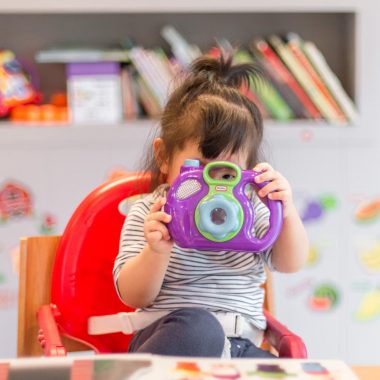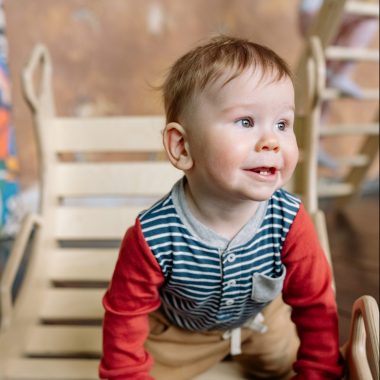How families bring up their children impacts the child’s development and resilience in the long run. Positive parenting is one such parenting method, and it has become increasingly popular in the last decade.
But what does it mean exactly? And what does it involve?
Unfortunately, there is a general misunderstanding of what qualifies as positive parenting, with many people believing that it entails being super agreeable and saying “yes” to everything. However, that is not what positive parenting is.
In principle, positive parenting is a method that encourages respectful relationships built on clear expectations.
An important part of positive parenting is showing children love, warmth, and kindness: “You are loved, you are good, you matter” is the basic message of this approach which helps children thrive in safety.
Several researchers have defined positive parenting, and the following universal definition is among the most comprehensive and clear definitions:
“Positive parenting is the continual relationship of a parent(s) and a child or children that includes caring, teaching, leading, communicating, and providing for the needs of a child consistently and unconditionally.”
As you can see, positive parenting principles involve building a strong bond with your child and guiding them to become effective leaders throughout their childhood.
What is positive parenting, and how is it done?
Harvard University pediatrics suggest that the main concept behind positive parenting is that all children are born good and inclined to do what is right. When we look for the good and reinforce the behaviors we want to see in our children, they feel good. When
children feel good; they behave well.
On the other hand, when children feel bad, they don’t act pleasantly. Plus, any behavior that will grab our attention increases, whether that attention is positive or negative.
When children show behaviors that we don’t like (such as whining), and we reinforce them with our attention (e.g. by saying, “stop whining!”), they learn that those behaviors are how they can get our attention.
Hence, that behavior is reinforced, so children are likely to do it again, especially if
another behavior doesn’t get a reaction from us.
Experts say that, in the end, the strongest booster of any behavior is an adult’s attention. So, if a child demonstrates a behavior you like, praise it. Notice when a child behaves well and tell them!
How can you implement positive parenting?
Harvard University experts underline ten positive parenting tips which might be helpful for you to perceive and apply this model.
1. Reward behaviors you want to see with attention
If a young child is sitting and playing quietly with toys, pause for 3-4 minutes and sit beside them. Ask them what they’re playing with and which car (doll or building block) you can use. Follow their lead and allow them to direct the play. After a few minutes, say that you’re going
to finish your work and that you’ll check in soon.
You have shown them that playing quietly on the floor gets your attention.
2. Reward good listening with special activities
When you ask a toddler, who typically has trouble with transitions, to put their shoes on, and they do it the first time they are asked, say: “Thank you so much for putting your shoes on right away! You were so quick that now we have time to read a story before we go outside.”
3. Reward gentle touch with recognition and praise
If you are dealing with an older sibling struggling to adjust to a new baby, how they interact with the newborn can sometimes be rough. Make sure to notice gentle touches. If you observe a gentle touch with the baby, say: “I love seeing you use gentle hands with the baby. You’re such a kind big sibling!”
Not only does this reinforces a desired behavior, but it also tells the child how you want them to behave in the future. (“You’re such a kind big sibling” rather than “Don’t hit the baby!”)
4. Avoid naming unwanted behavior
When the same sibling chooses to give the baby a bop on the head, resist the temptation to give negative attention by correcting the bad behavior.
This moment is an opportunity to teach empathy and kindness. Don’t react to the child who hit; instead, go to pick up and comfort the baby. Tell the baby: “I’m so sorry that you are hurt. Let me give you a kiss.”
Later, when the older sibling is calm, you can read books about using gentle hands
and talk about how happy it makes you when they give you hugs and kisses.
When the child is calm, show them a pillow or cushion they can hit if they feel the need
to use rough hands. Tell them what a great big sibling they are. Avoid naming
and framing the behavior you don’t want to see. Instead of “Don’t hit the
baby,” try “I love when you use gentle hands.”
5. Praise them when directions are followed
When you ask a child to come into the room for dinner, and they stomp the whole way, say, “Thank you for coming when I asked!”
The child is doing what you asked. Later, when they are calmer, the child will remember that you were calm and in control.
6. Praise good behavior
If a child is holding your hand in a parking lot or while crossing a street, notice and praise the good behavior you would like to reinforce.
For instance, say, “I love it when you stay right next to me.”
7. Model the behaviors you want and show respect
Although it can be challenging to control your emotions, put in the required effort to do so. Children learn the most from watching the behaviors of adults around them.
Modeling good behavior is more powerful than telling a child what to do.
If you want your child to speak kindly, speak to them and others around you kindly.
If you want your child to respect you, show them respect.
8. You should always take a break when needed
When we become frustrated and yell, it teaches our children to yell when they are frustrated, too. Spanking doesn’t work for the same reason. When we are angry and we hit a child, that child is more likely to behave aggressively.
Staying in control can be tough. It’s okay to tell your child, “I need a moment to
take some deep breaths, and then I can come back and help you.”
When you feel yourself losing your temper or having the urge to yell, try putting your hand on your chest. Take a few deep breaths and focus on calming yourself down.
9. Routines are important
Routines help children feel safe and secure and promote good behaviors.
Children feel good when they know what to expect.
10. Remember to have fun
Look for ways to have fun with your child. When a child feels connected to caregivers, they are more likely to listen to them.
Fun and connection can happen in small moments throughout the day.
What is the best age to start positive parenting with your child?
Experts recommend practicing positive parenting right from the beginning.
The best age to start this approach is right at the infant level. Researchers indicate that children under one benefit greatly from positive parenting.
This is because:
- A positive parenting approach results in a secure parent-child relationship.
- A secure attachment between parents and children is related to positive developmental outcomes like self-esteem, trust, self-competence, etc.
Hence, positive parenting should begin as early as possible.
What are the benefits of positive parenting?
Below you will find some of the benefits of applying the positive parenting approach:
Stronger bonding between parents and children
Strong bonding between child and parents is very important. Positive parenting helps you with that. With the help of behavioral development techniques, this approach builds trust between children and parents.
As a result of positive parenting, a child might have positive conversations with their parents.
Strong bonding with your child will give them the confidence to readily come to you with their problems and any questions they have as they grow older.
Better and effective flow of communication
One of the main principles of positive parenting is to encourage a positive and pleasant conversation with your child.
- Encourage your child to have an open conversation about their thoughts, beliefs, and feelings and guide them on how good behavior choices can spread good feelings and happiness.
- Effective communication works best when it is a two-way process. So, it is highly recommended that you also share your experiences and feelings with your child regularly.
- Listening is as important as speaking! Make sure you are patient enough to listen to everything your child has to say.
Higher self-esteem and happiness
Positive actions, mutual trust, and effective communication result in a happy home environment, thereby boosting your child’s self-esteem.
Focusing more on encouragement and improvement as a parent will help your child get a positive approach in life.
A happy and pleasant environment at home means less stress for both parents and children.
Sets a positive example for kids
Being an inspiring and good role model for your child is extremely important. Kids learn to behave by looking at the examples set by their parents.
Reduces negative behavior
It is very important to understand that as parents, you must set controlled limits for your children. Positive parenting encourages you to adopt positive alternatives to negative actions.
Enhances mutual respect
Developing mutual trust between you and your child is another important aspect of positive parenting.
Rules are very important for children. But you must make your child understand why those rules are set instead of just stating them. For instance, if you tell your child they are not supposed to go out without your permission, you need to tell them that it is for their safety. This is one example where mutual respect arises.
Where does the power of positive parenting come from?
According to experts at UC Davis, positive parenting is about
- showing children love, warmth, and kindness.
- guiding children to act the way you want by encouraging and teaching them
- helping children thrive by sending this powerful message: You are loved, you are good, and you matter.
Researchers reveal that positive parenting has several advantages.
Positive parenting sets children up for success
Positive parenting helps children do better in school, have fewer behavioral problems, and have stronger mental health.
Positive parenting helps the teenage brain
Neuroscientists discovered that positive parenting contributes to better functioning in the brain regions associated with emotions and cognition during the teen years.
Positive parenting is linked to a happy and healthy adulthood
Harvard scientists found that positive parenting has long-term benefits, including better relationships, mental health, and well-being during adulthood.
What are positive parenting skills?
Positive parents should always:
- Make their expectations clear
- Be consistent and reliable
- Show affection and appreciation
- Seek to understand their children
- Encourage curiosity, independence, and personal development
- Focus on what they can control
Positive parenting tips for infants
Babies learn a lot in the first year of life and reach many important developmental milestones. During this stage, babies also develop bonds with their parents and others as part of social and emotional development.
How parents meet their baby’s needs, cuddle, hold, and play with them sets the basis for how their baby will interact with others.
Below are some tips you can use to be a positive parent to your child:
- Talk to your baby. Your baby will feel safe and calm down.
- Answer when your baby makes sounds by repeating the sounds they make. This will help them learn to use language.
- Read to your baby. This will help them develop and understand language and sounds.
- Sing to your baby and play music. This will contribute greatly to their brain development.
- Praise your baby and give them your kind attention.
- Spend time cuddling and holding your baby. Your baby will feel safe and secure.
- Play with your baby. Play improves every child’s cognitive, physical, social, and emotional well-being.
- Take care of yourself physically, mentally, and emotionally. Do not ignore your needs. Parenting is a long journey and sometimes gets quite difficult. Always remember that enjoying spending time with your baby is easier when you feel good.
Positive parenting tips for toddlers
During the second year, toddlers are more aware of themselves and their surroundings. They will demonstrate a greater desire to explore new objects and people and show greater independence.
One day you may feel you are on a bumpy road; the other, you may feel you are living the best days of your life. That is all normal because this journey is not linear. If you need some tips about positive parenting and bonding safely with your developing child, you can try:
- Reading to your toddler daily
- Playing matching games with your toddler, like shape sorting and simple puzzles
- Encouraging them to explore and try new things
- Helping them develop language skills by talking with them
- Encouraging your child’s growing independence by letting them help with dressing and feeding themself
- Responding to wanted behaviors more than unwanted behaviors
- Setting an example of the behaviors you want by practicing them yourself
- Encouraging your child’s curiosity and ability to recognize common objects by taking field trips together to the park or going on a bus ride
References: cdc.gov, parentingfirstcry.com, positivepsychology.com, mindfullyhealing.com, pubmed.ncbi.nlm.nih.gov, health.ucdavis.edu, pediatrics.developingchild.harvard.edu, nidirect.gov.uk










